Douglas B. Hegdahl, 77, is one of the unsung heroes of the Vietnam War
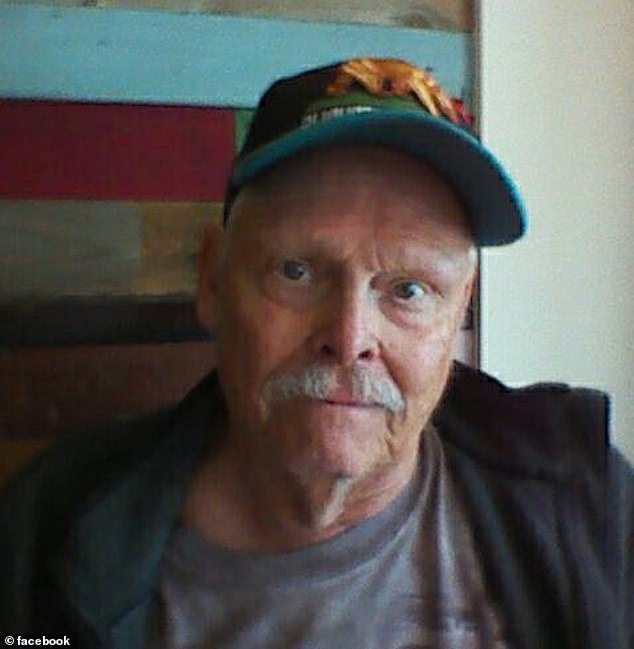
Hegdahl, now 77, secretly memorized the names of 256 American servicemen held prisoner in Vietnam, allowing them to be reclassified from MIA to POW years before the war ended
The captured US Navy sailor known to his North Vietnamese guards as ‘The Incredibly Stupid One‘ had a sneaky trick up his sleeve.
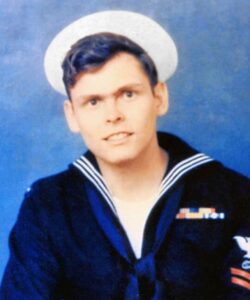
Navy sailor Douglas B. Hegdahl survived for two years in the infamous ‘Hanoi Hilton’ prison by posing as an illiterate fool
During the Vietnam War, Seaman Apprentice Douglas B. Hegdahl survived for two years in the infamous ‘Hanoi Hilton’ prison by posing as an illiterate fool, while secretly memorizing the names of 256 American servicemen held there.
Memorized to the tune of ‘Old MacDonald Had a Farm’, the list of names likely saved many lives, by confirming the men were still alive and putting immense pressure on the North Vietnamese to release them at the war’s end.
Hegdahl, now 77, is living quietly in San Diego, retired after an illustrious career spent teaching at the US Navy SERE (Survival, Evasion, Resistance and Escape) School at Naval Base Coronado.
A family member told DailyMail.com he is ‘not really interested in attention in general’ and didn’t wish to speak publicly about his harrowing war experience.
But Hegdahl is one of the great unsung heroes of the Vietnam War, and a legend among fellow veterans and former POWs. THIS is his remarkable tale of survival…
Born in 1946 in Clark, South Dakota, Hegdahl enlisted in the Navy in 1966 with one goal: he wanted to see Australia.
The Navy granted his wish with an assignment to the USS Canberra, with a recruiter telling Hegdahl that the guided missile cruiser would likely make a port call at its namesake city in Australia during his hitch, according to a fellow POW’s account.
Hegdahl was trained as a gunner’s mate, but before the ship made it Down Under, it was sent to patrol off the the coast of Vietnam, where American intervention had rapidly escalated.
On April 5, 1967, Hegdahl was due to work an early morning watch, but beforehand decided to get some fresh air on the deck, apparently unaware that the ship’s eight-inch guns were firing at targets on Vietnam’s Highway 1.
Recoil from the guns knocked Hegdahl overboard, and when he came to in the water, his cries for help were drowned out by the boom of artillery.
He watched treading water as the Canberra sailed over the horizon, but vowed to survive.
Hegdahl fashioned a crude lifejacket out of his pants, and made his way towards shore once the sun came up in the east. He was in the water for 12 hours before Cambodian fishermen rescued him.
Though the fishermen were friendly, they immediately turned him over to the North Vietnamese, who accused him of being a CIA commando. Hegdahl, who was carrying no ID, had to think quickly to outsmart his captors.
‘I had probably the most embarrassing capture of the entire Vietnam War,’ Hegdahl recalled in an interview for the 1997 documentary, Vietnam POWs: Stories of Survival.
‘I found that my defense posture was just to play dumb. Let’s face it, when you fall off the boat, you have a lot to work with,’ he added.
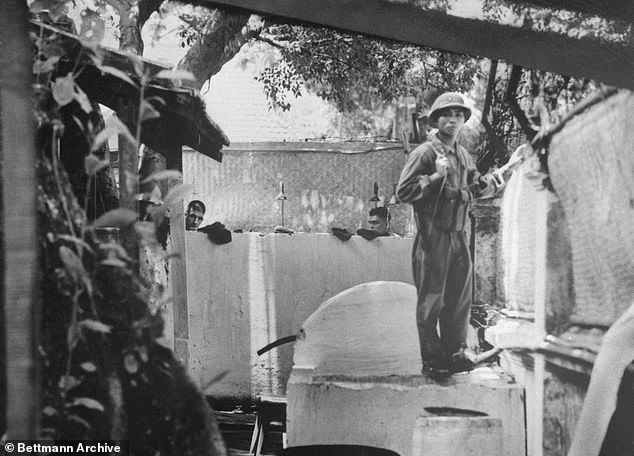
Seaman apprentice Douglas Hegdahl (right) and Lt. Cmdr. Richard Stratton take showers in the Hanoi Hilton. This photo, made by two East German photographers was one of the first views published in America of captured servicemen in Vietnam
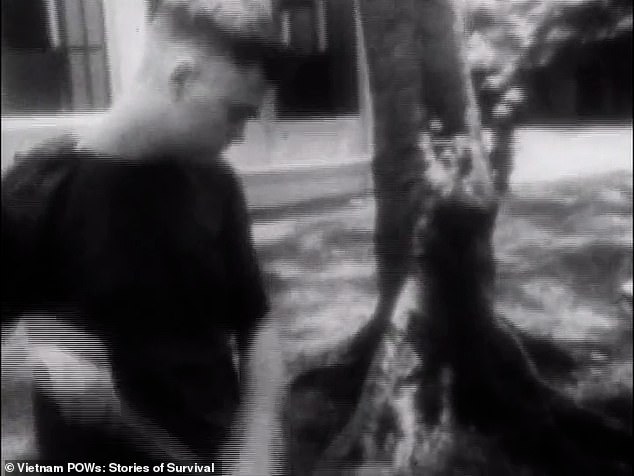
Hegdahl, seen in an East German propaganda video, was allowed to roam freely in the camp and tasked with sweeping the courtyard after convincing guards he was an illiterate fool
Hedgahl was taken to Hỏa Lò Prison, better known as the Hanoi Hilton. Nearly all the other prisoners were captured pilots, and as an enlisted man he was among the most junior-ranked POWs.

The gates of the infamous Hoa Lo prison, also called the Hanoi Hilton, are seen above
At first, prison guards were astonished when Hegdahl eagerly agreed to write out propaganda statements condemning the US.
But as they dictated the statement, he asked how to spell every word, and wrote in an illegible chicken scratch, pretending to be illiterate and telling them he was a ‘poor peasant’ from North Dakota.
The guards believed they had struck gold with a prisoner foolish enough to do their bidding, and brought in a tutor to teach him how to write.
But they soon found Hegdahl to be an unteachable student, apparently unable to grasp even the rudiments of the written word, and gave up trying to tutor him.
Probing for weaknesses, the guards once asked Hegdahl what he wanted more than anything in the world, expecting him to answer that he wanted to return home.
He confounded them by thinking hard and responding ‘a pillow,’ since the prison camp beds had none.
The guards began to refer to Hegdahl as ‘The Incredibly Stupid One’ and considered him harmless enough to roam freely in the prison camp, where he was tasked with sweeping up.
‘That’s not a very heroic resistance posture, but it got me through some pretty tough times,’ Hegdahl recalled.

‘I found that my defense posture was just to play dumb. Let’s face it, when you fall off the boat, you have a lot to work with,’ Hegdahl recalled in a 1997 interview
Hegdahl was assigned to a cell with an Air Force pilot, Lt. Joseph Crecca Jr, who speculated that the enlisted sailor would be among the first released, and tasked him with memorizing the names of every POW.
‘At first I thought it would be an impossible task,’ Hegdahl recalled in a 1998 documentary, Return With Honor.
But Crecca advised him to use a rhyme or jingle to help him commit the names, and Hegdahl selected the tune of ‘Old MacDonald Had a Farm’.
Eventually, Hegdahl memorized the names and ranks of 256 men, as well as details such as Social Security numbers or a pet’s name to verify their authenticity.
Meanwhile, Hegdahl used his freedom as he swept the prison yard to sabotage five North Vietnamese trucks, waiting for the guard to fall asleep, and then putting a small amount of dirt in the gas tanks at a time.
‘I saw five trucks towed disabled out of the prison camp,’ wrote fellow POW Dick “Beak” Stratton, a Navy pilot, in an essay about Hegdahl.
‘Doug Hegdahl, a high school graduate from the mess decks fell off a ship and has five enemy trucks to his credit,’ added Stratton, saying that Hegdahl is one of only two men he knows of who destroyed enemy equipment while a POW.
Stratton continued: ‘I am a World Famous Golden Dragon (VA 192) with two college degrees, 2000 jet hours, 300 carrier landings and 22 combat missions. How many enemy trucks do I have to my credit? Zero.’
To sow dissent and break the spirits of prisoners, the guards would sometimes dangle the offer of an early release to those who cooperated.
Naval officer James Stockdale, who later ran for vice president in 1992 on Ross Perot’s ticket, was the most senior officer held in the Hanoi Hilton, and strictly forbade any men to accept early release.
‘I put the word out, no fink releases,’ Stockdale recalled in the 1997 documentary. ‘Accept no amnesty, we all go home together.’
Prisoners who disobeyed Stockdale’s orders and accepted the early releases were considered ‘rat finks’ and traitors by the men who remained behind.
But when the guards offered Hegdahl a chance at release, his superiors among the POWs ordered him to accept it, and get the information he had about the prisoners back to the Pentagon.
‘Doug did not want to be put in the same boat, the same thought process, with those rat finks,’ recalled Stratton.
‘So he was hesitant. He did not want to be tarred brushed with a “go home early label”. And it’s a measure of I think, his bravery that he took a very unpalatable order and obeyed it.
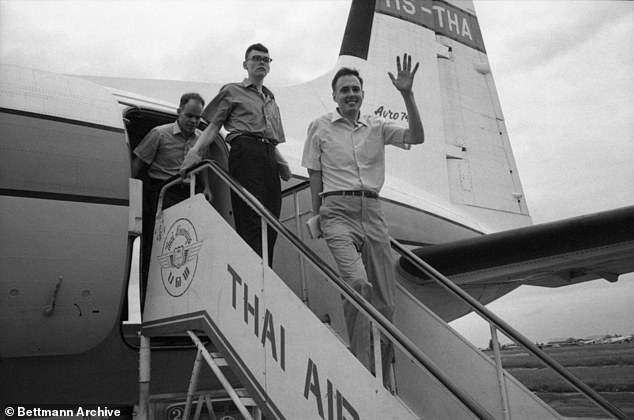
Douglas B. Hegdahl (center) arrives back in the US with two other prisoners released from North Vietnam in 1969
Hegdahl was released on August 4, 1969, alongside two other men who, unlike him, did not have orders to accept release.

Accompanied by anti-war activist Rennie Davis (right), Hegdahl (second from left) and the two other prisoners freed alongside him are seen after their release
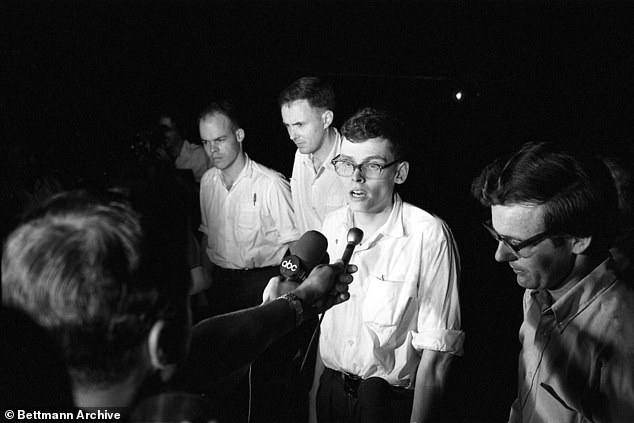
Hegdahl, who lost 60 pounds in captivity, addresses the press after his release
When he sat down in a debriefing and began reeling off names in a sing-song jingle, the stunned interviewer asked him to slow down.
‘No, it’s like riding a bicycle, you tip over,’ Hegdahl recalled answering.
He later said: ‘But that was the thing I was probably most proud of, to change the status of quite a few people from MIA to POW.’
Hegdahl received an honorable discharge from the Navy on July 1, 1970, and remained in the inactive reserves until October 24, 1972. He achieved the rank of Petty Officer 2nd Class.
He went on to teach survival skills at the Navy SERE School for many years, and in 1998, at a reunion dinner for POWs, he was still able to recite the complete list of names.
Although other early returnees carried a stigma for accepting release before all prisoners could return home, Hegdahl was always embraced by fellow POWs.
Written by Keith Griffith for the Daily Mail ~ February 17, 2024
